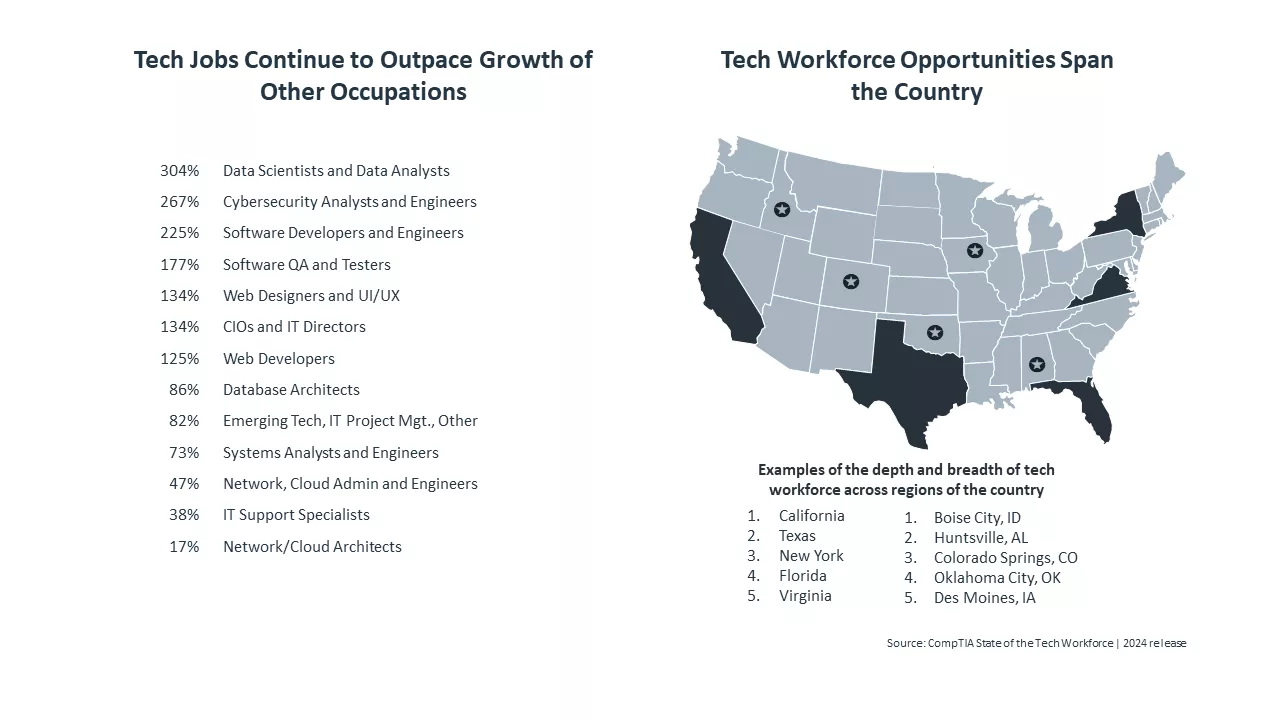Latest Tech Hiring Trends, Challenges, and Opportunities (2024 and Beyond)
As businesses increasingly rely on advanced digital tools and processes, the need for highly skilled professionals is more pressing than ever. However, finding the right talent has become a complex challenge. Today’s companies must look beyond traditional qualifications and adopt new strategies that prioritize adaptability, diverse skill sets, and innovative thinking.
What makes tech hiring particularly unique is its constant need for agility. As industries become more reliant on emerging technologies, businesses require candidates who can evolve alongside those changes. A rapidly changing digital landscape demands a workforce that is not only technically proficient but also versatile enough to take on new challenges.
Moreover, recruitment in tech is no longer limited by geography—remote work has broadened the talent pool, making it even more competitive for companies to attract the best candidates.
Whether it’s adapting to the pace of technological change or finding ways to offer flexible work environments, businesses must continuously evolve their approach to recruitment. This strategy requires not only careful planning but also a keen awareness of industry trends and future demands. This article explores the notable tech hiring trends and opportunities today.
7 Key Tech Hiring Trends to Know
With the tech industry in constant flux, the need for specialized talent continues to grow. Tech hiring trends in 2024 and beyond show that companies are focusing on roles that address both technological advancements and shifting business needs.
1. Workforce turnover and role expansion
A combination of rapid workforce turnover and the evolving demand for specialized roles will shape the tech hiring landscape over the next decade. One key trend is the high replacement rate for tech professionals, expected to average 6% annually from 2024 to 2034. This rate translates to roughly 350,000 tech workers needing to be replaced each year due to retirements, career shifts, or separations.
Alongside this, the overall tech turnover rate—which includes internal promotions and role changes—will average around 36% per year. This lower turnover compared to other high-turnover sectors underscores the stability of tech employment but also highlights a consistent need for recruitment.
2. Demand for IT talent
The demand for IT professionals in the US is experiencing a robust upward trend, with hiring expectations rising from 52% in Q1 2023 to a projected 61% by Q4 2024. Despite a slight dip in Q2 2023, likely due to seasonal factors, the overall growth highlights the tech sector’s ongoing recovery and expansion.
Continuous technological advancements, widespread digital transformation, and the increasing integration of tech across various industries drive this surge. As businesses recognize the importance of securing top tech talent for maintaining a competitive edge, they must refine their recruitment strategies.
To stand out in this competitive landscape, companies need to offer attractive career development opportunities, flexible work arrangements, and competitive compensation.
Moreover, focusing on comprehensive talent management—by investing in the development and retention of current employees—enables businesses to navigate the challenges of the tech hiring environment while capitalizing on emerging opportunities.
3. Growth in specific tech roles
A second major hiring trend is the extraordinary growth projected for specific tech roles, with data scientists, cybersecurity analysts, and software developers leading the way. For example, demand for data scientists is expected to rise by 304% in the next ten years, while cybersecurity analysts will see a 267% increase.

Source: CompTIA
These figures reflect the critical role that data security and analytics will play in shaping the future of businesses. The growing importance of these roles is linked to the rise in cyber threats and the increasing reliance on data-driven decision-making.
Employers must focus their recruitment strategies on these high-growth areas, particularly as businesses adopt advanced technologies like AI, machine learning, and cloud computing. Developing internal talent for these emerging roles is also crucial, as external recruitment alone will not meet the growing demand for these specialized skills.
4. Location and expertise as key drivers to tech wage
Tech wages are influenced by two main factors: regional differences and expertise. Salaries vary greatly depending on location, largely due to the cost of living. For instance, a high wage in San Francisco may not stretch as far as in lower-cost areas like Des Moines.
Additionally, a worker’s role and experience play a significant role—specialized positions like AI experts or cybersecurity analysts command higher wages. Entry-level professionals typically earn less but can advance with experience, while senior roles in cities like San Jose often exceed $100,000, including bonuses.

Together, these two trends are critical considerations for both tech employers and job seekers as they navigate the competitive hiring landscape. Businesses looking to hire specialized roles may turn to expert executive recruiters to streamline the hiring process for top-tier professionals.
5. The rise of AI and machine learning
Artificial intelligence and machine learning have moved beyond buzzwords and are now integral to many industries. According to a report by the McKinsey Global Institute, advancements in digitization, robotics, and AI could result in up to 14% of the global workforce needing to shift to new careers by 2030. This shift is driven by the rapid adoption of these technologies, which will likely transform existing jobs and require new skill sets.
The demand for AI specialists and machine learning engineers is skyrocketing as companies seek to leverage these technologies for automation, data analysis, and predictive modeling. Roles focusing on developing AI algorithms, enhancing natural language processing, and creating intelligent systems are becoming critical hires in sectors ranging from healthcare to finance.
These roles are a prominent feature of recruitment technology trends, with companies eager to automate processes and drive efficiencies through AI innovations.
6. Niche roles in emerging technologies
A significant trend in tech hiring is the increasing demand for niche roles driven by the rapid maturation of emerging technologies like blockchain, quantum computing, and cloud engineering. This collective demand for niche tech roles underscores the need for companies to adjust their hiring strategies to attract the specialized talent required for emerging technologies.
The global blockchain market, valued at USD 26.91 billion in 2024 and projected to reach USD 1,879.30 billion by 2034, is fueling demand for blockchain developers, especially in finance and logistics. Similarly, quantum computing is drawing significant investment, creating new opportunities for quantum engineers in research-driven sectors. These roles are becoming critical as companies integrate advanced technologies to stay competitive.

Cloud computing is expected to grow into a $1 trillion market by 2029 as businesses increasingly rely on cloud engineers with skills in managing multi-cloud environments, virtualization, and relevant tools. For hiring, companies need to focus on recruiting cloud engineers with expertise in these areas to support the growing reliance on cloud infrastructure, ensuring efficiency and scalability across industries.
Additionally, the growth of DevOps and full-stack developers reflects the need for streamlined application development and efficient software deployment, further emphasizing the importance of specialized technical expertise.
7. Soft skills: adaptability, communication, and collaboration
While technical expertise remains crucial, soft skills such as adaptability, communication, and collaboration cannot be overlooked. For tech professionals in leadership roles—such as tech leads, IT managers, and CTOs—these skills are essential for managing teams effectively.
The ability to navigate changing technologies and lead distributed teams requires strong problem-solving abilities and emotional intelligence, making soft skills critical for success.
Adaptability, empathy, and communication are particularly valuable when addressing complex challenges in fast-paced environments. As tech hiring trends evolve, companies are increasingly focused on candidates who exhibit well-rounded qualities, such as critical thinking and effective teamwork.
To effectively assess these traits during recruitment, companies can incorporate behavioral and situational interview techniques, as well as psychometric testing. This approach helps identify candidates who not only possess technical know-how but also the soft skills necessary to thrive in leadership and collaborative roles.
Challenges and Opportunities in Tech Hiring
Companies face both significant challenges and promising opportunities when hiring talent. The fast-paced nature of tech advancements requires businesses to rethink their recruitment strategies, focusing on finding specialized skills while adapting to shifting workforce dynamics. Leveraging the opportunities resulting from these tech hiring trends is crucial for companies to remain competitive and innovative in the digital age.
1. Skill shortages and the competition for top talent
One of the most pressing challenges facing tech companies is the continued shortage of skilled professionals, particularly in high-demand fields like AI, data science, cybersecurity, and cloud computing. In particular,
The competition for top talent is fierce, especially as global demand for these skills increases. Major tech hubs like Silicon Valley, New York, and London compete with emerging markets, causing salary expectations to soar and making it difficult for smaller companies to attract the right candidates.

However, this challenge also presents a major opportunity: investing in internal training and development programs. Companies that commit to upskilling and reskilling their existing workforce can cultivate the talent they need from within, significantly reducing reliance on external hiring.
Organizations that adopt this strategy can not only fill critical roles faster but also increase employee retention, as workers are more likely to stay with companies that invest in their professional development.
2. Workforce model shifts
As tech professionals become more open to contract work, companies are moving away from prioritizing permanent roles. This shift is largely influenced by digital transformation needs and the flexibility required to address specific project demands.
Companies can capitalize on the increasing openness to contract and freelance roles, filling immediate project needs and specialized skill gaps quickly. This workforce model provides businesses with a more adaptable workforce, which is especially crucial for ongoing digital transformation efforts.
3. Adapting to fast-evolving technology
As emerging technologies like blockchain, quantum computing, and 5G reshape industries, companies face the challenge of keeping their workforce up-to-date with these innovations. Hiring for specialized roles in these cutting-edge fields is difficult due to the relatively small talent pool and the rapid pace of change.
However, this challenge presents an opportunity for companies to stay ahead of the curve by investing in continuous learning and development programs. Fostering a culture of lifelong learning and ensuring employees are equipped with the latest technological skills allows companies to maintain a competitive edge.
Training programs, certifications, and partnerships with educational institutions are all viable ways to ensure that the workforce is capable of adapting to new technologies. These opportunities enhance the company’s ability to innovate while improving employee retention, as workers feel empowered by the opportunity to grow their skills.

4. Compliance with evolving regulations
As tech companies expand their hiring practices globally, staying compliant with ever-changing labor laws, tax regulations, and data privacy requirements has become increasingly complex. The rise of remote work adds another layer of complexity, with countries introducing new regulations around cross-border employment, remote work taxation, and employee rights.
While navigating these regulatory challenges can be difficult, it also offers an opportunity for companies to streamline their operations. By adopting advanced compliance management tools, businesses can automate the tracking of labor laws and regulations, ensuring that they remain compliant across different jurisdictions.
These tools help mitigate risks, reduce administrative burdens, and allow companies to focus on growth while minimizing legal complications.
5. Streamlining recruitment processes
Extended, complicated hiring processes are becoming outdated, leading to candidate drop-offs and hiring inefficiencies. In a competitive market, slow processes can mean losing top talent to quicker-moving companies.
Employers can streamline the recruitment process through data-driven strategies and clear salary transparency, which, in turn, reduce candidate drop-off rates and secure high-demand talent more efficiently. Faster, transparent processes also enhance the candidate experience, improving overall hiring outcomes.

Embracing the Future of Recruitment
In today’s rapidly evolving tech environment, hiring the right talent requires more than just filling open roles—it demands a strategic approach. Businesses that can adapt to shifting trends, prioritize flexibility, and invest in skills development will be best positioned to thrive in the long term.
To stay ahead, partnering with a trusted employment agency can make all the difference. Recruiting Connection is an expert recruiting firm in Salt Lake City that offers the expertise and resources you need to secure top talent and meet your hiring goals.
Whether you’re seeking to fill tech roles or looking for HR recruitment agency in Utah, you can contact our team and learn how we can find the right talent that will drive your success.

Struggling to find top
talent for your business?
Connect with the expertes at Recruiting Connection and discover the difference our full-service recruitment can make.
Contact Us Today
















